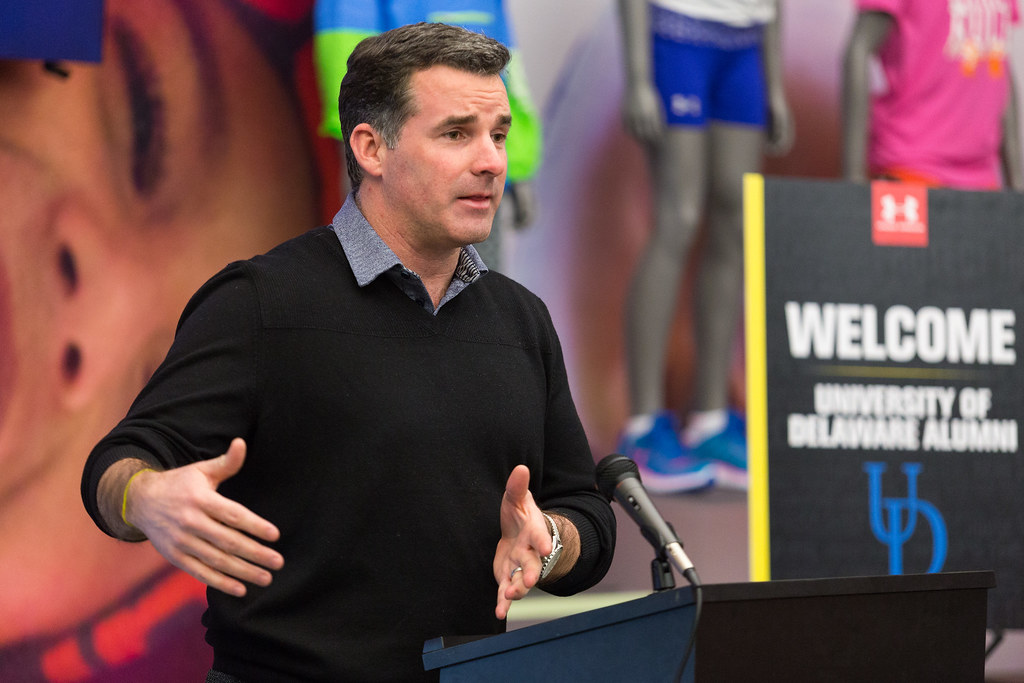
Under Armour Headquarters in Baltimore Maryland with Under Armour CEO Kevin Plank
 The founder and CEO of Under Armour (NYSE:UA), Kevin Plank, always refers to the company’s employees as “teammates.” Although this has become a standard human resources trope, it’s been Plank’s attitude since day one of UA. This isn’t too surprising, as the company’s creation was rooted in Plank’s time as a walk-on member of the University of Maryland’s football team.
The founder and CEO of Under Armour (NYSE:UA), Kevin Plank, always refers to the company’s employees as “teammates.” Although this has become a standard human resources trope, it’s been Plank’s attitude since day one of UA. This isn’t too surprising, as the company’s creation was rooted in Plank’s time as a walk-on member of the University of Maryland’s football team.
The first inklings of what would grow to become one of the world’s primary sports apparel brands happened in that holy ground of the team experience – the locker room. It was there that Plank noticed what a poor job traditional cotton t-shirts did as an undergarment for football players. They got wet and never dried out and changing them was cumbersome.
Noting that there were other articles of clothing being made with more modern moisture-wicking materials, upon graduating from college, Kevin Plank began building the team that would take his startup – at first operated out of his grandmother’s basement – and transform it into a major player in the global sports industry. It’s one of the most cited contemporary business success stories, and Plank has always emphasized that it was a team effort.
The Concept of Team
These early days of UA included informal alliances with a number of Plank’s former football teammates. They tested his prototypes and eventually served as a word-of-mouth networking agency that spread the word about UA’s innovative products. Before breaking out as a national brand, UA was a locker room guerilla-marketing success story.
The whole concept of teammates and teamwork was deeply embedded in Plank’s approach to creating a successful, winning business. And having grown up playing sports and – especially at the University of Maryland – being teammates with individuals from a wide range of socioeconomic backgrounds, Plank was pre-programmed to create a team-like corporate culture. It is one based not only on individual achievement but also on shared responsibility and an awareness that diversity is not just an abstract concept, but rather a way to build the best team and, in the context of business, succeed at building market share.
“You’ve got to be thoughtful with your team and, what you have to understand, is that their success or their failure is always a reflection on the culture that we build, the team that we have, and the parameters that we put in place in order to build our team.”
“The team that we put together is not always a team who’s got the most perfect pedigree, who comes from the best schools, and comes from the other pieces. But it’s about the chemistry,” Plank shared at the awards ceremony of the 2010 Cupid’s Cup. “And ultimately, that chemistry is what builds your culture. Our culture happens to be built much like a team, right. And as we say, you know, ‘our company operates still like a team.’”
The Cupid Cup, now national in scope, was founded by Plank and the Robert H. Smith School of Business at the University of Maryland to identify and reward young entrepreneurs who were still in college. It has been a primary avenue for Plank to share his thoughts and beliefs about building a successful corporate culture with entrepreneurs just beginning their journeys.
“You’ve got to be thoughtful with your team and, what you have to understand, is that their success or their failure is always a reflection on the culture that we build, the team that we have, and the parameters that we put in place in order to build our team,” said Plank. “The number one quality that every entrepreneur, every business – the number one criteria – that we are looking to evaluate is what is the likelihood of these entrepreneurs to be able to attract and retain great talent? And a key component is how are they going to communicate with that talent?”
It’s clear that, to Plank, attracting and retaining great talent is synonymous with building a great team. But that means first developing the system on which the team is based. That is the permanent, underlying corporate culture that is created and nourished that will guide the business’s operations and growth.
“When I say you need a team, like, you need a culture. Because teams – different things will happen – and teams will evolve and players will graduate and there’ll be circumstances, but the culture is what you’re replacing always, and I think that’s the one thing I’m probably most proud of in our company, [one] that’s been defined as just the strength of [its] culture,” he explained to Peter Guber, co-owner of the Golden State Warriors and Los Angeles Dodgers, at a public forum after Plank received the 2017 John Wooden Global Leadership Award.
Taking Stock and Growth
That’s not to say that ramping up from a tight group of team members in a start up environment to managing one of the premier brands in the world was an easy transition. That’s also not to say that UA isn’t facing many of the same challenges regarding diversity and equity that are major forces in contemporary culture. Many of those challenges revolve around, essentially, expanding the concept of who is going to be on the team and how teammates are expected to interact with each other.
“The hard thing with building a business is that the first thing that I wanted to do is… build a house. I want to build a great house. And as you grow, you realize that house has become a building, and it’s gotten to be a tall building, and the first thing is that for any entrepreneur – as the CEO – I am fully responsible for everything that happens in my company,” said Plank, reflecting on his leadership experience at an Economic Club public event in 2018. “But what I’m required to do – and what I’m accountable for – is the actions we take when bad things happen. I think we’ve been incredibly proactive when it comes to issues that arise, and this is something that’s going to happen in any organization the size of 14,000-plus. So, we’ll continue to make our community proactive and will continue to invest into our culture – to make sure it is inclusive, it is diverse, it is something that is an equal opportunity for anyone who wants to join our brand, and we encourage that. And again, that’s not just simply a statement; it’s the best thing for our business.”
Plank has realized, over his two decades of leading Under Armour, that what worked at the beginning of the company and what works for it today are not the same. Much of that transformation is rooted in his realization that expecting a team to permanently keep the pace of 20-somethings running a startup was not realistic. That was not a system that the team could run efficiently over the long term. Realizing that didn’t necessarily come naturally to Plank.
“What I want to be able to do is control the controllables – our performance, paying full bonuses to our team, delivering on the promises we set out for [Wall] Street and having that always exceed expectations. I live my life from the whiteboard, and one of [the mantras we had] was ‘overpromise and deliver,’ and that defined Under Armour’s culture, which was like ‘go, go, go,’” said Plank, while explaining the evolution of UA’s corporate culture in a 2019 interview with FN, a trade magazine of the footwear industry. “Then you realize some people were like, ‘Man, I’m tired’ and ‘I can’t go at this rate anymore.’ I certainly learned a lot of lessons. Do I have regrets? I think many of us do. But I’m also proud of where we are and where our team is.”
Watch CNBC’s exclusive interview with Under Armour CEO Kevin Plank
Under Armour CEO Kevin Plank joins “Squawk on the Street” via phone to discuss the company’s sponsored teams that made it into the Final Four, and about the retail industry.
Building the System
Where UA and its team are today is not only at the forefront of the sports apparel industry but also on the leading edge of corporate giving and workplace inclusion. Plank has ensured that – as UA has grown – it has incorporated innovative programs to ensure that a modern, inclusive work environment is created and maintained.
Among the stated goals on the Diversity & Inclusion section of the Community page on its website, UA pledges to provide “targeted development, mentoring, and sponsorship programs to increase representation and retention of underrepresented minorities and women at all levels of the organization.” There is a commitment to “mitigating biases, blind spots, and increasing cultural competency concepts into UA’s core leadership training” and a promise to “flex [the company’s] economic, cultural, and spending power to improve the overall diversity of [its] marketplace.”
One core method of carrying out these goals is the company’s Culture Clubs and Allies, which are created to encourage teammates to find common cause and provide mutual support. These include focused sociocultural groups, such as the LGBTQ Unified, Leading and Empowering Asian Development (LEAD), Black Employees Achieving Together (BEAT), the Latino Alliance, the UA Military Veterans Club, and Women Inspiring Leading Living (WILL). Other groups take on broader social issues, such as Parents for Professional Growth (PPG) and Green Machine, which explores “sustainability-related innovation.” Sustainability is a core commitment of UA and one reason it opposed the United States’ withdrawal from the Paris Agreement, an international legal charter sponsored by the UN Framework Convention on Climate Change.
Another aspect of team building is UA’s alliances with external nonprofit organizations to pursue social justice and community building. Its Armour Days are marked by UA employees pitching in on specific projects in their communities. In May and June of 2019, there were events in 30 cities around the United States and the world, including Moscow, Guangzhou, Santiago, and Sydney. There is also year-round support from UA for workers who donate time to local non-profit service providers.
With the philanthropy arm of the corporation, #WeWill, UA funds a wide range of charitable enterprises that usually focus on projects to serve communities in need. UA received the 2019 ESPN Sports Humanitarian Corporate Community Impact Award in recognition of its work.
Philanthropic efforts are part of UA’s corporate commitment to diversity and inclusion and, according to its webpage, a way to “harness the passion of our teammates to stand up for what we believe in and make a difference in the world.”
Diversity and Inclusion
Just as Plank recognizes that UA facilities need to be fully integrated into the communities of which they are a part, the fact is that UA is now a huge international company, and that this carries certain responsibilities. It’s truly a global brand, and the leadership of the company, starting with Plank, realizes that it must play a leading role in the transformation of the broader business culture that is currently undergoing deep changes in expectations and norms.
“When you look at the S&P 500, I believe there’s a systematic, global inequity that’s prevalent right now. And I think you’re seeing a lot of this come up, and I think there’s a massive opportunity for organizations to use this moment of time to really enhance – and again, this isn’t a requirement, this isn’t to be legislated – this is something that can actually be a generator for us,” Plank explained at the Economic Club. “We have a $1.2 billion women’s business. I don’t feel like we get anywhere near enough credit for it, and I do believe, as we continue to increase the number of diversity – especially women – in leadership, I think you’ll watch that number double and triple in the years to come.”
One of Plank’s concrete steps in this direction includes being one of the early signers of the “CEO Action Pledge for Diversity and Inclusion,” which was initiated by PwC Chairman and Senior Partner Tim Ryan. It asks CEOs to make three initial commitments: “First, continue to make their workplaces trusting places to have complex and sometimes difficult conversations around diversity and inclusion. Second, implement and expand unconscious bias education. And then, share best practices and share practices that don’t work. Each organization creates their own action plan and training to meet these goals.”
This kind of soul-searching is, Plank admits, a work-in-progress and must start at the top of the team pyramid. In the early days, UA was a small group of employees bringing one product at a time to the marketplace in relative obscurity. Now, it releases new products with Super Bowl ads and worldwide rollouts, with many of its products serving the needs of women athletes. That’s forced Plank to grow with his company.
“I’m very deliberate, and I have a point of view, and I can’t apologize for that. I can make sure that I’m always respectful, though, at the same time. I’m never rude. I’m never curt. I never cut people off,” Plank shared with FN. “I let people voice their opinions and their inputs. Whether we do or don’t listen to an idea isn’t descriptive of what [our company’s] culture is.”
Eventually, it all wraps back to building a team environment, one in which individuals can best achieve their potential while contributing to the collective effort.
“The most important quality is building your team,” Plank said at an event sponsored by the John Wooden Global Leadership Fellows. “And so we talk about product story, service, and team being the foundation, the tenants, of you know, hopefully the company that we have and what we try to build every day.”
Find Kevin Plank Online

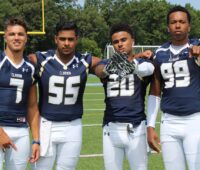
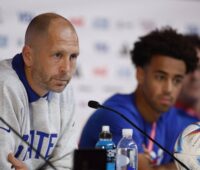
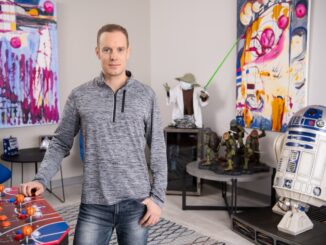

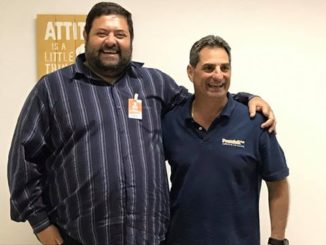







Leave a Reply
Be the First to Comment!
You must be logged in to post a comment.
You must be logged in to post a comment.